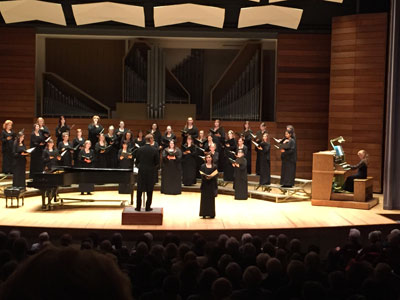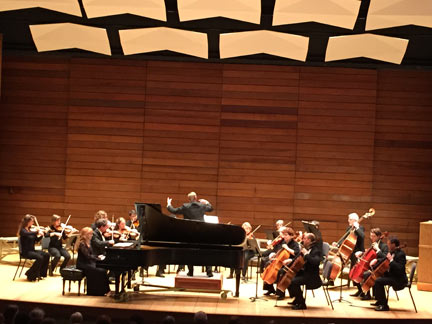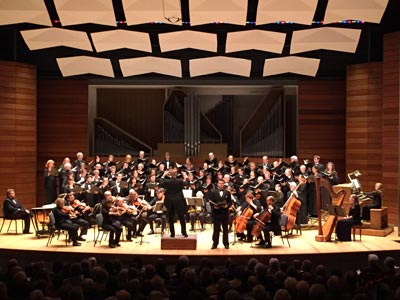On Sunday, February 8, 2015, the Southern Oregon Repertory Singers, under the direction of Dr. Paul French, took their audience at the SOU Music Recital Hall in Ashland on a musical journey reflecting on the seasons of life in The Passing of Time concert. I’ve written about Dr. French in these pages before (“His is a world that extends to the far flung corners of the earth, encompasses remarkable music from a wide array of locales, as well as an expansive time frame, and includes a substantial amount of beautiful music that most of us have never encountered.” http://bit.ly/1E6e12k). In this current concert, Dr. French has once again exposed the audience to a selection of sublimely beautiful, rarely heard, and exquisitely performed music (his words: “a concert of transporting beauty”).
The featured piece on the program (doesn’t EVERY program have a featured piece?) was Gabriele Fauré’s Requiem, which actually is performed often enough that it’s not so rare. The twist that made THIS performance unique is that for this concert, the Requiem was performed using Fauré’s original orchestration, as Fauré presented the piece in 1888, using strings, horn, timpani and harp. Later, at the end of the 1890’s, Fauré’s publisher, Hamelle, suggested that the composer should rescore the Requiem for performance in concert halls, where a larger orchestra would be preferable, so a new score was published in 1901, which, with subsequent revisions, exists as the version most often performed today, and comprises mixed choir, solo soprano, solo baritone, two flutes, two clarinets, two bassoons, four horns, two trumpets, three trombones, timpani, harp, organ, violins, violas and cellos. There is some controversy whether the rescored version was done by Fauré himself, who was not greatly interested in orchestration, or whether Fauré delegated some or all of the revision to one of his pupils. The original version of the Requiem, with the chamber orchestra orchestration, IS RARELY performed, and has not been in recent memory, if ever, at any venue in or around Southern Oregon. So no one in the audience had heard this before.
Fauré poured all of his talent, skill, soul and passion into his requiem, about which he said “Everything I managed to entertain by way of religious illusion I put into my Requiem, which moreover is dominated from beginning to end by a very human feeling of faith in eternal rest.”
Dr. French offered this comment on Fauré’s Requiem: “The Fauré Requiem is a perfect piece of music. It is lyric and lovely, a gem of refined beauty.” That it certainly was, in Sunday’s performance. The beauty of the piece, and the peaceful, reassuring, positive theme embodied in it by Fauré were rendered to near perfection, in a performance that took one’s breath away. Here are two short excerpts from the Requiem performance, to provide some sense of what the audience experienced: first, the choral introduction at the beginning of the opening Introit and Kyrie movement and second, an excerpt including a baritone solo from the penultimate Libera Me (“Free me, Lord”) movement:
Opening minute (from Introit and Kyrie) of Gabriel Fauré’s Requiem, performed by the Southern Oregon Repertory Singers, directed by Dr. Paul French, in The Passing of Time concert at S.O.U. Recital Hall, Ashland, OR on Feb. 8, 2015
90 sec. excerpt of Baritone Dan Gibbs and the Southern Oregon Repertory Singers, directed by Dr. Paul French, singing the Libera Me movement of Gabriel Fauré’s Requiem in The Passing of Time concert at S.O.U. Recital Hall, Ashland, OR on Feb. 8, 2015.
This being a Dr. Paul French directed Southern Oregon Repertory Singers concert, there had to be more to it than just a near perfect performance of the original version of Fauré’s Requiem, and, of course, there was. The Requiem, though the highlight of the program, was merely the second HALF of the concert, which followed the intermission. Before the intermission, the audience was treated to seven additional, infrequently performed, many not well known, extraordinary, and quite beautiful pieces of music, given fresh exposure, drawn from the remarkable expansive musical world of Dr. French.
The program opened with an all female voices performance of Gabriel Fauré’s Messe Basse, a short mass. Messe Basse was originally composed in 1881, predating the Requiem, but revised by Fauré several times, ending in 1906, with the final version leaving only the gentler and more peaceful movements, and highlighting their rich harmonies. In this concert, the women sang the harmonies beautifully, embodying a soothing peacefulness and calm that would likely have pleased the composer and certainly pleased the audience. Notable in this performance were solos by soprano Amanda Gerig, who was in fine voice this day, and mezzo soprano, Shelly Cox.

Soprano Amanda Gerig singing solo during Kyrie movement of Gabriel Fauré’s Messe Basse with the Southern Oregon Repertory Singers, directed by Dr. Paul French, in The Passing of Time concert at S.O.U. Recital Hall, Ashland, OR on Feb. 8, 2015
Next, the full choir presented a piece, drawn from Dr. French’s vast knowledge of the choral repertoire, composed in the year 2000 by contemporary composer, Frank Ticeli, setting to music the Sara Teasdale poem, There Will Be Rest. The piece gave the soprano and high voices an opportunity to soar and shine. In its most memorable segment, the lyric repeats the phrase “I shall find the crystal of peace above me” (i.e., Teasdale’s stars), sung in a peaceful, affirming way, that approaches the mood of Fauré’s Requiem to follow later in the program. (No coincidence that Dr. French programmed it that way!)
That was followed by two Songs of Joy by 20th Century composer, Gerald Finzi, Haste on my joys and My spirit sang all day. Finzi, who lost three brothers as a child and then lost a mentor at the Western Front in World War I, had a bleak outlook on life, and is best known for writing music elegiac in tone. [http://en.wikipedia.org/wiki/Gerald_Finzi] Leave it to Dr. French to uncover this pair of out-of-character joyful choral pieces by Finzi, setting to music two poems by Robert Bridges. Again, uplifting, positive, affirming and well sung choral music, all in keeping with the mood of this program.
Following that, the choir sang a piece by latter 20th Century composer, Sir John Tavener, Song for Athene. This piece may have been the most well known on the program. Although it was written in 1993, as an elegy for a friend who died prematurely as an accident victim, it became famous in 1997, when it was performed at Princess Diana’s funeral. Like much of the other material presented in this concert, it was sung with a deliberate, calm, peacefulness, though it was certainly more funereal in tone than much of the rest of the program. Perhaps the most remarkable and certainly most memorable part of this piece was a continuous drone (ala traditional Byzantine sacred music) by the basses. That the entire section could hold such a note for that extended a period, without anyone going flat is a tribute to their skill and the preparation by their director, Dr. French. Kudos gentlemen!
Moving closer to intermission, for the next piece, the choir returned to Gabriel Fauré, performing one of his earliest pieces, composed as a 19 year old student in 1865, Cantique de Jean Racine. The young Fauré held strong religious convictions, but a casual religious attitude, and was considerably more conservative in his harmonic style than he would evolve to in his maturity. Still, Cantique displays a soft and gentle choral setting, providing an early hint of the mood found in his later sacred music. Thus pointing towards and leading to the Requiem to follow, in Fauré’s repertoire and on this program.
Finally, for the last piece before the intermission, the choir was dismissed, and the chamber orchestra was brought to the stage. Perhaps a bit unexpected in a choral concert. Having discovered 20th Century composer, Gerald Finzi, whose atypical joyful choir pieces were performed earlier in the program, Dr. French now dug out an even rarer find, Finzi’s instrumental Eclogue. Finzi composed very few purely instrumental compositions, though he did labor over them early in his career. He began what was thought to be intended as a piano concerto, but never finished it nor gave it a title. After his death, his publisher provided names for two of the movements and published them as separate works, the first titled as Eclogue. This piece instrumentally presents a gentle, contemplative mood, adding an orchestral component to the theme presented in the previous choral pieces and pointing to the peaceful elegiac mood created through the mixed contribution of choir and orchestra together in the Requiem performance to come after the intermission. Notable in this last piece before intermission was the superb piano part performed by incomparable keyboardist, Jodi French.

Pianist Jodi French and chamber orchestra, directed by Dr. Paul French, performing Gabriel Fauré’s Eclogue, in The Passing of Time concert at S.O.U. Recital Hall, Ashland, OR on Feb. 8, 2015
Dr. French is well known as a driven perfectionist, hard to please when working with his choirs, as frequently documented in the Facebook Group, The Paul French appreciation club! (https://www.facebook.com/groups/2259109246/) A recent example:
“Today during chamber choir:
‘It’s hard to sound good. Thanks for trying.’
The king of backhanded compliments.”
But after the completion of Sunday’s performance, even the hard-to-please perfectionist was led to say “I was happy with this concert.” It was THAT good.
The Southern Oregon Repertory Singers will next perform in the Americas the Beautiful concert on Saturday Apr. 25 at 7:30 pm and Sunday, Apr. 26 at 3:00 pm at SOU Music Recital Hall, Ashland. It is described as a celebration of the music of North and Latin America. Featured music includes selections by Morten Lauridsen, Samuel Barber, Aaron Copland, Harry Somers, Latin American folksongs by Guido Lopez-Gavilan, and spirituals of Moses Hogan and Adolphus Hailstork. For tickets, order online at http://repsingers.org/tickets or order by phone at 541-552-0900 (leave a short message with your number and best time to return your call).

 Lee Greene was born & raised in a NJ family where the only religion worshipped was classical music, Leonard Bernstein was God, and the radio was constantly on and tuned to classical station WQXR (which is now always on in his Jacksonville home thanks to the miracle of the Internet). Growing up in the New York City metropolitan area and later while residing and practicing law in NYC, Lee attended oodles of Broadway and off-Broadway theater productions, as well as concerts and opera at Lincoln Center, Carnegie Hall and other NYC venues. Lee is now a retired attorney, runs a computer support business, and has served on the boards of Rogue Opera & Siskiyou Violins. Lee also writes Performing Arts reviews published on the website,
Lee Greene was born & raised in a NJ family where the only religion worshipped was classical music, Leonard Bernstein was God, and the radio was constantly on and tuned to classical station WQXR (which is now always on in his Jacksonville home thanks to the miracle of the Internet). Growing up in the New York City metropolitan area and later while residing and practicing law in NYC, Lee attended oodles of Broadway and off-Broadway theater productions, as well as concerts and opera at Lincoln Center, Carnegie Hall and other NYC venues. Lee is now a retired attorney, runs a computer support business, and has served on the boards of Rogue Opera & Siskiyou Violins. Lee also writes Performing Arts reviews published on the website,